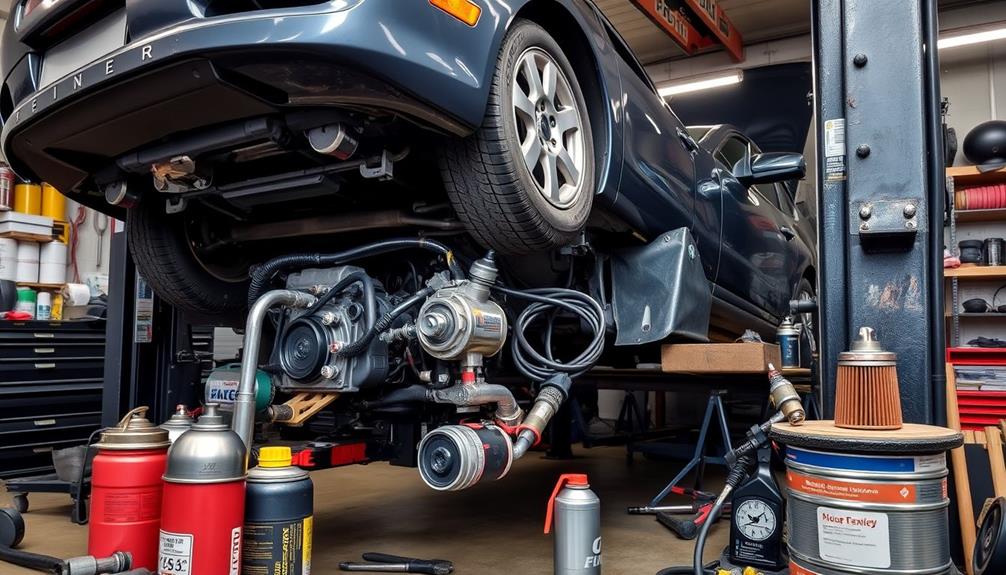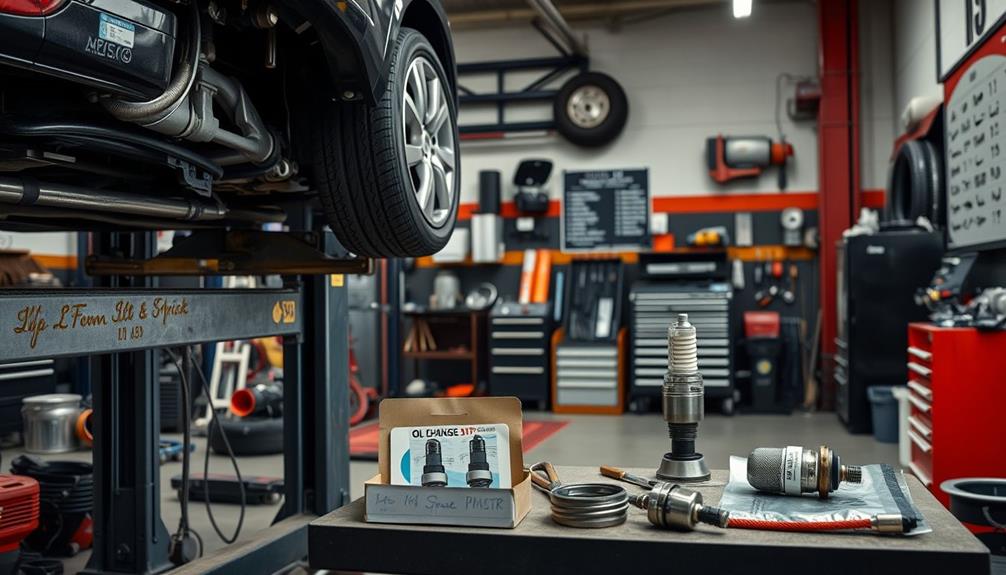A car tune-up consists of important maintenance tasks that boost your engine's performance and fuel efficiency. You'll typically check and replace spark plugs, air filters, and fuel filters. It also involves inspecting ignition wires, cleaning the throttle body, and ensuring hoses and belts are in good shape. Regular tune-ups help catch minor issues before they turn into costly repairs, keeping your ride smooth and your engine responsive. Generally, it's recommended to schedule a tune-up every 5,000 to 30,000 miles. Stick around, and you'll uncover more details about the benefits and timing of tune-ups.
Key Takeaways
- A car tune-up includes inspecting and replacing spark plugs, ignition wires, air filters, and fuel filters to optimize engine performance.
- Throttle body and fuel injector cleaning are performed to enhance engine responsiveness and maintain fuel system efficiency.
- Hoses and belts are inspected for wear, preventing potential engine damage and ensuring smooth operation.
- Regular tune-ups can improve fuel economy by 4-12%, leading to cost savings on fuel.
- Routine inspections catch minor issues early, preventing costly repairs and prolonging vehicle lifespan.
Definition of a Car Tune-Up
A car tune-up is essential for keeping your vehicle running smoothly. It refers to routine car maintenance aimed at optimizing engine performance. This service typically involves inspecting and replacing components like spark plugs, air filters, and fuel filters. A car tune-up can also include checking and adjusting the ignition timing, as well as inspecting the drive belts and hoses for any signs of wear and tear. Following a specific car tuneup checklist can help ensure that all necessary maintenance tasks are completed, keeping your car in top condition and preventing any potential issues down the road. Regular tune-ups can also improve fuel efficiency and extend the lifespan of your vehicle.
While tune-ups initially focused on adjustments within ignition systems, they now encompass a broader range of services that help maintain your vehicle's overall health and efficiency.
Regular tune-ups can enhance fuel economy by 4-12%, allowing you to save on fuel costs while improving engine performance and longevity.
You might be wondering how often you should schedule a tune-up service. Generally, it's recommended based on mileage, with intervals ranging from every 5,000 to 30,000 miles, depending on your vehicle's age and the manufacturer's guidelines.
Key Components of Tune-Ups
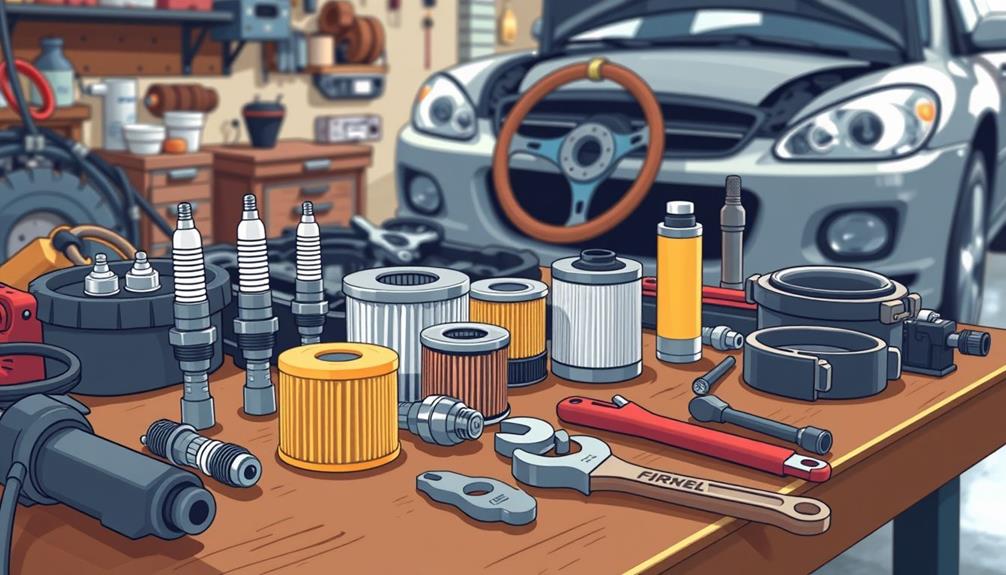
When it comes to keeping your car in top shape, understanding the key components of a tune-up can make all the difference. One of the most critical parts is the spark plugs. You should change them every 30,000 to 40,000 miles to guarantee peak engine performance. Worn spark plugs can lead to poor fuel economy and rough idling, affecting your overall driving experience.
Along with spark plugs, ignition wires are replaced during a tune-up. These wires are essential for proper electrical transfer from the ignition coil to the spark plugs. If they're worn or damaged, you might experience misfires, which can greatly impact your vehicle's performance.
Another important component is the engine air filter. A clean air filter allows for better airflow into the engine, promoting efficient combustion.
During a tune-up, you'll also likely have the fuel filter replaced to guarantee clean fuel delivery. Additionally, the technician may perform throttle body cleaning to remove carbon buildup, enhancing your engine's responsiveness.
Regular inspections of belts, hoses, and fluids are also integral, helping you catch potential issues before they escalate into major problems.
Importance of Regular Tune-Ups
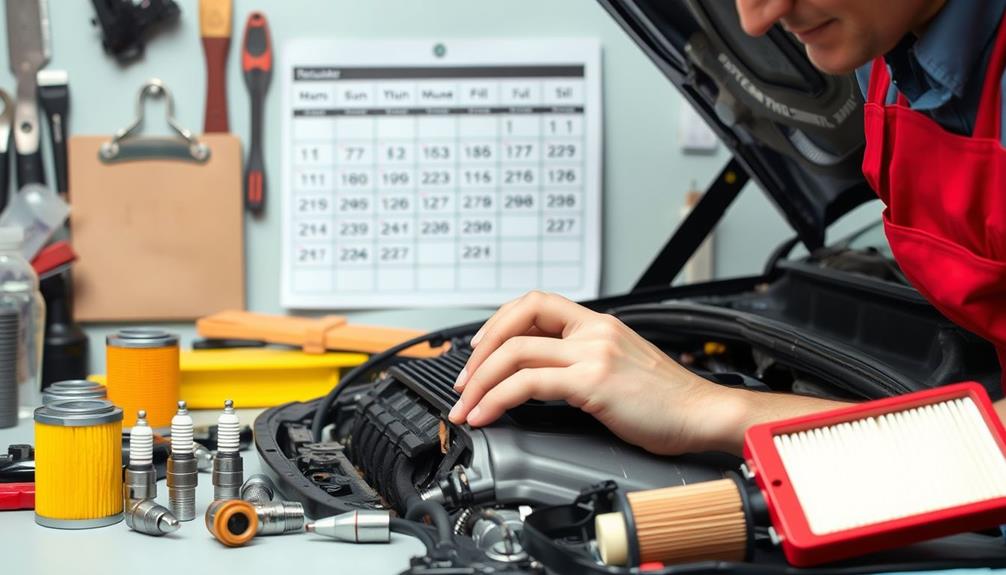
Regular tune-ups are essential for keeping your engine performing at its best, ensuring a smooth ride.
They can also improve your fuel efficiency, helping you save money at the pump.
Plus, by catching minor issues early, you can prevent costly repairs down the road.
Enhances Engine Performance
Keeping your engine in top shape is essential for peak performance, and regular tune-ups play an important role in achieving that. When you stay on top of your maintenance schedule, you'll notice significant improvements in engine performance. Over time, engine efficiency naturally declines due to wear and tear, making routine inspections and adjustments vital.
Regular tune-ups allow expert technicians to identify and fix issues within the ignition system, preventing strain that could lead to costly engine damage. Catching these minor problems early helps you avoid more extensive repairs down the line, enhancing your engine's overall health.
By following the manufacturer-recommended tune-up interval, you're not just prolonging the lifespan of your vehicle, but you're also ensuring it operates at its finest. A well-maintained engine runs smoother and responds better, making your driving experience more enjoyable.
Investing in regular tune-ups is a proactive approach to vehicle care. It keeps your engine performing at peak efficiency and helps you make the most of your investment, ensuring you get the reliability and performance you expect from your car.
Improves Fuel Efficiency
Boosting your fuel efficiency is one of the key benefits of regular tune-ups. By investing in routine maintenance, you can enhance your vehicle's fuel economy by 4-12%. This translates to significant savings, especially with rising fuel costs.
Here are some important aspects of tune-ups that contribute to better fuel efficiency:
- Worn Spark Plugs: Replacing faulty spark plugs prevents misfires that can hurt your fuel efficiency and increase emissions.
- Throttle Body and Fuel Injector Cleaning: Ensuring these components are clean allows for proper fuel delivery, which is essential for maintaining good fuel economy.
- Early Issue Detection: Regular tune-ups help you spot potential problems that could decrease your mileage, allowing for timely repairs.
A well-maintained engine runs more efficiently, reducing strain on its components and optimizing the fuel-to-air mixture.
With a consistent tune-up schedule, you can enjoy a smoother ride and better gas mileage, all while extending the life of your vehicle.
Prevents Major Repairs
One of the most compelling reasons to schedule tune-ups is the potential to prevent major repairs down the road. By adhering to a routine maintenance schedule, you can identify and address minor issues before they escalate into costly repairs that strain your budget and time.
For instance, regular inspections of critical components like spark plugs and filters can help you avoid engine misfires and stalling, ensuring your vehicle operates smoothly and safely.
Incorporating regular tune-ups not only enhances vehicle performance but also extends its lifespan. When you follow the manufacturer's recommended maintenance schedule, you keep your engine running efficiently and effectively.
This proactive approach reduces the likelihood of unexpected breakdowns that could lead to dangerous situations on the road.
Additionally, preventative maintenance helps maintain your vehicle's fuel economy, further saving you money and minimizing your environmental impact.
Signs Your Car Needs a Tune-Up
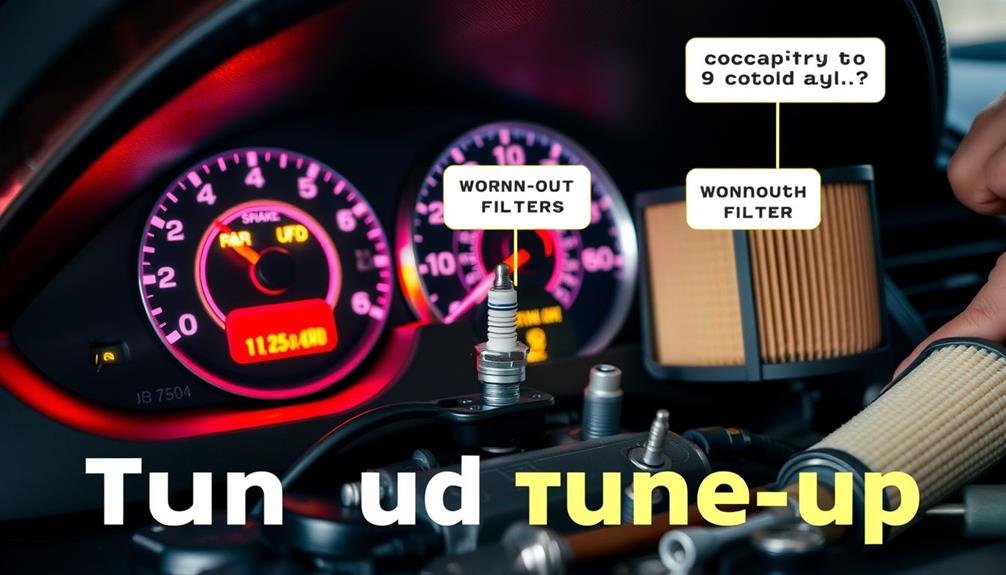
Noticing specific signs can tell you when your car needs a tune-up. Ignoring these indicators can lead to bigger problems down the road, so it's crucial to pay attention.
Here are a few signs your vehicle might need some TLC:
- Check engine light: This warning often signals underlying engine issues, prompting a necessary tune-up.
- Reduced performance: If you're experiencing sluggish acceleration or difficulty starting, it's likely time for a tune-up to address engine inefficiencies.
- Poor fuel mileage: A decrease in fuel efficiency by 10% or more could indicate problems in the fuel or ignition system.
Additionally, if your car is stalling or has poor idling, it may point to issues within the fuel system or ignition system that need attention.
Knocking noises from the engine can also be a red flag, suggesting that a thorough diagnostic and tune-up is in order.
Keeping an eye on these signs will help you maintain your vehicle's performance and longevity. Don't wait until it's too late; take action and schedule that tune-up!
Additional Maintenance Services

A thorough tune-up goes beyond just fixing immediate issues; it often includes several essential maintenance services that keep your car running smoothly.
One key service is spark plug replacement. Regularly replacing your spark plugs every 30,000 to 40,000 miles guarantees peak engine performance and fuel efficiency.
Another important aspect is fuel filter replacement. By replacing the fuel filter, you guarantee clean fuel delivery to the engine, which can prevent performance issues like rough idling or stalling.
Additionally, technicians often recommend fuel injector cleaning to maintain system cleanliness and efficiency.
You should also expect a detailed inspection of your vehicle's hoses and belts. Technicians look for signs of wear, like cracks or leaks, which can lead to catastrophic engine damage if left unchecked.
Scheduling Your Tune-Up

Scheduling your tune-up is crucial for keeping your vehicle in top shape. To determine the right time, monitor your mileage and check your owner's manual for manufacturer-recommended service intervals, usually every 6 months or 5,000 miles.
Here are some key signs that indicate it's time for a tune-up:
- A drop in fuel efficiency, especially if you notice a 10% decrease in miles per gallon.
- Strange engine behaviors, like stalling or knocking noises.
- Frequent trips with heavy loads that can wear down your engine faster.
Older vehicles may require more frequent tune-ups, so stay alert. Keeping track of your vehicle maintenance records can help you identify when a tune-up is due.
If you experience any of the warning signs mentioned above, don't hesitate to schedule your tune-up. Timely maintenance services can help prevent bigger issues down the road and guarantee your car remains reliable.
Finding Professional Repair Help
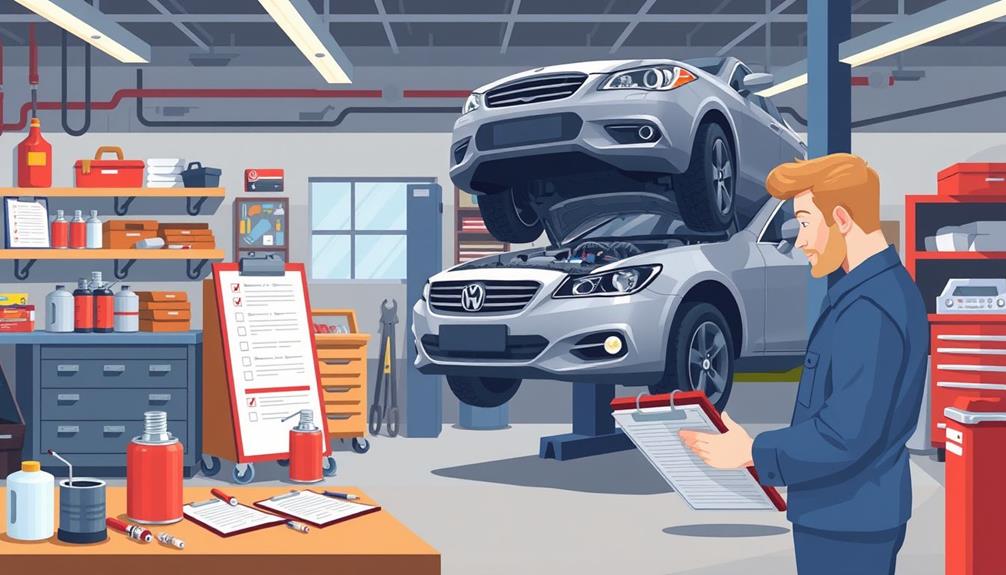
When it comes to maintaining your vehicle, finding reliable professional repair help is essential. A thorough tune-up is a key maintenance procedure that can greatly enhance your car's performance.
Look for a service center like Seeburg Service Center, where ASE-certified mechanics are skilled in performing detailed engine inspections and tune-ups. They verify all necessary components, such as spark plugs and filters, are meticulously checked and replaced as needed.
One of the best features of Seeburg Service Center is their convenient online scheduling options, making it easier for you to manage your vehicle's care. Whether you live in southwest Missouri or northwest Arkansas, you'll have local access to professional auto care that caters to your specific needs.
Before scheduling your tune-up, don't hesitate to discuss any concerns with the mechanics. This conversation not only helps tailor the service to your vehicle's unique requirements but also guarantees you receive the most effective maintenance procedure possible.
Cost of a Car Tune-Up

When it comes to the cost of a car tune-up, you'll find prices can vary widely.
Basic tune-ups typically range from $40 to $150, while more specialized services can set you back anywhere from $200 to $800.
Factors like vehicle complexity, labor rates, and additional services all play a role in determining the final bill.
Tune-Up Price Ranges
Understanding the cost of a car tune-up can save you time and money in the long run. Tune-up price ranges vary considerably based on your vehicle's needs and the complexity of the services required. Here's what you can typically expect:
- Basic Tune-Up: Ranges from $40 to $150, usually covering essential checks and minor adjustments.
- Specialized Tune-Ups: Can cost between $200 and $800, depending on the specific parts of your vehicle that need attention.
- Labor and Parts: Labor costs in Canada typically range from $105 to $175 per hour, and a standard tune-up requires about 1.5 hours of labor.
When you consider replacement parts, like spark plugs, which range from $5 to $15 each, the total expense for a standard tune-up generally falls between $192.50 and $442.50.
Remember, if your vehicle needs additional services such as fuel system cleaning or air filter replacements, those will add to the overall cost.
Regular maintenance is essential, so budgeting for these tune-ups can keep your car running smoothly and save you from more extensive repairs down the road.
Factors Influencing Costs
Several factors influence the costs of a car tune-up, and knowing them can help you budget effectively. The basic price typically ranges from $40 to $150, but specialized tune-ups can go from $200 to $800, depending on your vehicle's complexity.
Labor costs in Canada vary between $105 and $175 per hour, with a basic tune-up taking about 1.5 hours.
Parts expenses also play a significant role. For instance, spark plugs can cost between $5 and $15 each, totaling around $15 to $120 for 4-8 plugs.
When you add up labor and parts, the overall expense for a tune-up generally falls between $192.50 and $442.50.
Keep in mind that additional services or repairs identified during the tune-up could increase your final bill. Mechanics often recommend maintenance based on what they observe, which can lead to unexpected costs.
Staying informed about these factors can help you plan your budget and guarantee your vehicle remains in top condition.
Frequently Asked Questions
What Does a Full Car Tune up Include?
A full car tune-up includes replacing spark plugs, ignition wires, and filters. You'll also get throttle body cleaning, fluid checks, and inspections of belts and hoses to keep your engine running smoothly and efficiently.
What Is the Average Cost of a Full Tune-Up?
Think of a tune-up as a spa day for your car. You're looking at an average cost between $192.50 and $442.50, depending on your vehicle's needs and the services required to keep it running smoothly.
What Is the Difference Between a Car Service and a Tune-Up?
A car service focuses on routine maintenance like oil changes, while a tune-up hones in on optimizing engine performance. You'll perform services more often, but tune-ups are essential for maintaining your engine's efficiency.
Does a Tune-Up Include Alignment?
A tune-up doesn't include wheel alignment; it focuses on engine components. If you notice uneven tire wear or steering issues, you should schedule a separate alignment service to guarantee your vehicle runs safely and efficiently.
Conclusion
So, you thought a car tune-up was just a fancy way to say, "I'll get to it when I can"? Think again! Regular tune-ups keep your engine happy and your wallet intact, saving you from those dreaded roadside surprises. Whether it's checking spark plugs or changing filters, a little maintenance goes a long way. Don't wait for your car to throw a tantrum—schedule that tune-up. After all, ignoring your car's needs is like skipping breakfast and expecting to run a marathon!
